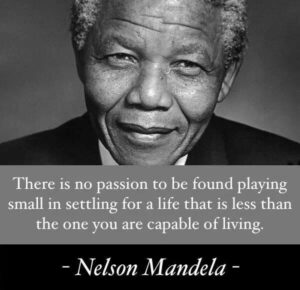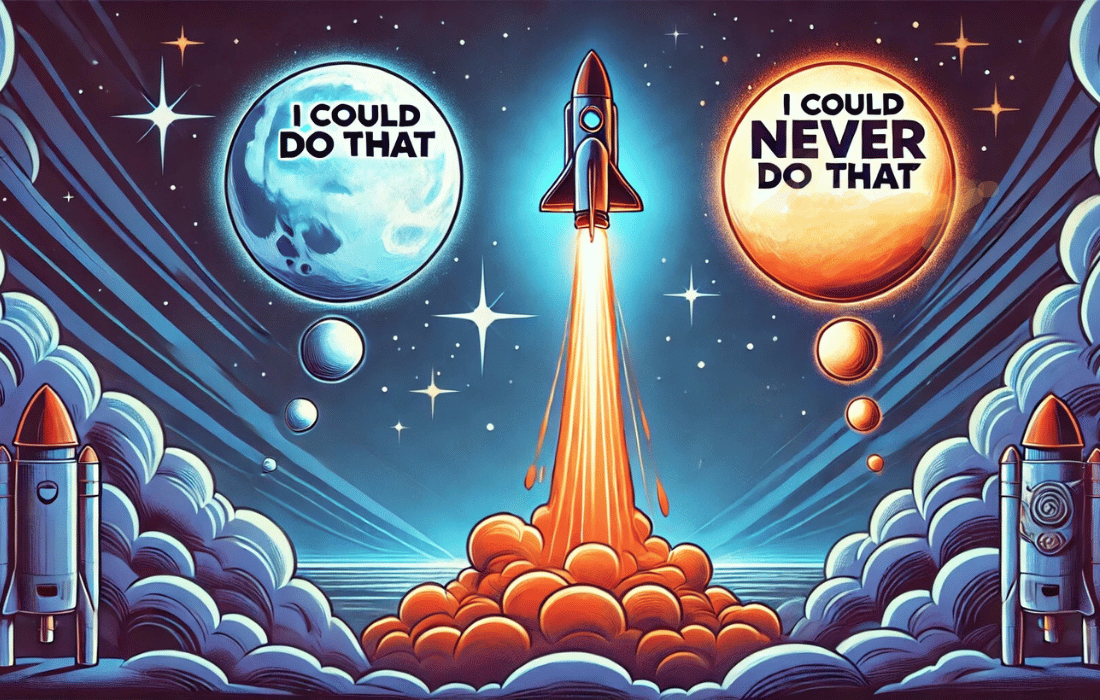Success, achievement, and greatness often evoke a wide range of reactions from those around us. Unfortunately, some of the most common responses are far from inspiring. There’s the “I could do that” crowd and the “I could never do that” crowd—two sides of the same coin, both reflecting unhealthy mindsets that hold people back from personal growth.
On this blog, kyletothemoon, the idea has always been about aiming big—really big. Dream to the moon, because even if you don’t quite make it, you’ll be a hell of a lot further than if you aim for the couch. In the context of success and the annoying responses we’ll explore today, think of this article as a launchpad for breaking free from mediocrity. Let’s dissect these reactions and use them as lessons to fuel your own journey toward real growth.
“I Could Do That” – The Couch Potato’s Anthem (And When It’s Actually Motivating)

Ah, the classic, “I could do that.” This phrase, when uttered in the wrong mindset, becomes the anthem of the armchair critic—the would-be achiever who comfortably sits in the bleachers while the players hustle on the field. When someone says this, what they’re often really doing is reducing another person’s hard-earned success to something trivial, something they could achieve if they only cared enough to try. However, there is a flip side.
Coulda, Woulda, Shoulda… But Didn’t (The Toxic Side)
Let’s face it—if someone truly could do something, they would. It’s as simple as that. Claiming “I could do that” while sitting on the sidelines not only minimizes someone else’s work, but it also exposes a deep insecurity. It’s easier to claim untapped potential than it is to face the reality that you’re not doing the work. Potential without action is meaningless.
As Epictetus once said, “It’s not what happens to you, but how you react to it that matters.” The person who says, “I could do that” in this context is reacting from a place of ego and fear, trying to justify their inactivity by diminishing the success of others. They ignore the real work behind the scenes—the grit, the failure, the persistence—and instead trivialize it as something anyone could do.
When “I Could Do That” Becomes a Catalyst for Action
But not everyone who says “I could do that” is sitting on their couch and doing nothing. In fact, for some people, seeing greatness inspires action. When you watch someone succeed and think, “I could do that,” followed by a burst of motivation to actually get to work, you’re harnessing a productive mindset.
There’s a massive difference between someone who uses the phrase as a shield to protect their ego and someone who views it as a spark of possibility. The latter sees success and immediately asks, “What do I need to learn? What steps do I need to take to make this happen for myself?” This mindset leads to growth, action, and ultimately, results.
Think about it this way: Thomas Edison didn’t say “I could do that” and then walk away from the challenge. He said it, and then spent countless hours experimenting and failing until he invented the lightbulb. The key is that he turned his belief into action. He understood that greatness requires effort and didn’t stop at the thought—he put in the work.
“I Could Never Do That” – The Defeatist’s Excuse (Versus Knowing Your Limits)
On the other side of the spectrum, we have the person who reacts to greatness with, “I could never do that.” This reaction is even more dangerous because it shuts down any possibility of growth before it even begins. It’s a statement of defeat—a mental block that limits not only what’s achievable but also what’s imaginable.
The Danger of Playing Small
 “I could never do that” is often said in a tone of resignation, as though greatness is something reserved for other people. It’s as if the person is admitting defeat before they’ve even entered the arena. But here’s the uncomfortable truth: The only reason you “could never” do something is that you’ve already decided not to try.
“I could never do that” is often said in a tone of resignation, as though greatness is something reserved for other people. It’s as if the person is admitting defeat before they’ve even entered the arena. But here’s the uncomfortable truth: The only reason you “could never” do something is that you’ve already decided not to try.
It’s easy to play small. It’s comfortable to stay in your lane, avoiding risks and challenges. But playing small comes with a heavy price—you never know what you’re truly capable of.
This mindset reminds me of a powerful quote by Marianne Williamson:
We’re often afraid of our own potential because it demands more from us. It asks us to step out of our comfort zones, to face failure, and to risk rejection. The person who says “I could never do that” is avoiding this discomfort. They’re choosing mediocrity because it’s safe.
The Importance of Knowing Your Limits (But Not Letting Them Define You)
There’s a big difference between saying “I could never do that” as an act of small thinking versus acknowledging real, physical limitations. For instance, someone with a heart condition may say, “I could never run a marathon,” and that could be true, depending on their circumstances. Knowing your limits is crucial to staying healthy, both mentally and physically.
But here’s the catch: too many people use “I could never do that” as a blanket statement for things they could achieve with the right mindset and effort. They say it not because they’ve hit an actual limitation but because they’ve chosen comfort over challenge. And that’s where small thinking begins to chip away at our potential.
Henry Ford once said, “Whether you think you can or you think you can’t—you’re right.” The mind is a powerful thing, and if you convince yourself that something is impossible, you’ll never try. On the other hand, acknowledging limitations doesn’t mean you give up. It means you push yourself within those limits and see how far you can stretch them.
In life, limitations can act as guides—helping you focus on areas of growth that are achievable. However, don’t let them box you into a mindset where you’re afraid to aim for the moon. Aim high, even if you fall short because every effort pushes you a little further than where you started.
The Middle Path: Aim Big, Accept Failure, Keep Going
There’s a balance to be struck between the arrogance of “I could do that” and the self-sabotage of “I could never do that.” True growth happens when we acknowledge our limitations while striving to push beyond them. We may not hit every goal, but as they say, “Shoot for the moon, and even if you miss, you’ll land among the stars.”
The Growth Mindset
The key to finding this balance lies in adopting a growth mindset, a term coined by psychologist Carol Dweck. In her groundbreaking research, Dweck discovered that people with a growth mindset believe their abilities can be developed through hard work, learning, and persistence. They see challenges not as threats but as opportunities for improvement.
Here’s the beauty of the growth mindset: It’s liberating. When you believe you can grow, failure stops being something to fear. Instead, it becomes a stepping stone to success.
Michelangelo once said, “The greater danger for most of us is not that our aim is too high and we miss it, but that it is too low and we reach it.” This sums up the importance of dreaming big. When we aim too low, we rob ourselves of the chance to stretch, grow, and achieve greatness.
Self-Development Strategies for Breaking Free from These Mindsets
Now that we’ve dissected these two annoying responses, let’s focus on practical strategies for moving beyond them. Here are some steps you can take to avoid the traps of arrogance and defeatism and to aim for something greater.
1. Define Your Own Success
First and foremost, stop comparing yourself to others. The “I could do that” and “I could never do that” mindsets both come from unhealthy comparisons. Instead, focus on defining success for yourself. What does greatness mean to you? What do you want to achieve, and why does it matter to you?
Remember, the journey to the moon looks different for everyone. Your goals don’t have to mirror someone else’s. Define success on your terms and stay laser-focused on achieving it.
2. Break Down Big Goals into Small Steps
One of the reasons people say “I could never do that” is that they’re overwhelmed by the scale of the goal. But here’s a secret: Every major accomplishment is the result of consistent small steps.
If you want to achieve something big, break it down into manageable tasks. Focus on what you can do today. Don’t worry about reaching the moon yet—just take the next step. Over time, those small actions will add up to something remarkable.
3. Cultivate a Growth Mindset
If you’re stuck in a fixed mindset—where you believe your abilities are static—it’s time to make a change. Start by adopting the belief that you can improve. Carol Dweck’s work on growth mindset is an excellent resource for learning how to shift your thinking. Embrace challenges, view failure as an opportunity to learn, and keep pushing forward.
4. Surround Yourself with Positive Influences
The people you surround yourself with have a massive impact on your mindset. If you’re constantly around people who say “I could do that” or “I could never do that,” you’ll start to adopt their thinking. Instead, seek out individuals who inspire you, challenge you, and encourage your growth.
As Jim Rohn said, “You are the average of the five people you spend the most time with.” Choose your circle wisely.
5. Celebrate Your Wins
Finally, make sure you celebrate your progress along the way. Too often, we get so focused on the big goal that we forget to appreciate the small victories. Whether completing a project, reaching a milestone, or simply sticking to a new habit, every win counts.
Acknowledging your success reinforces a growth mindset and keeps you motivated for the next challenge.
To the Moon (And Beyond)
In the end, the annoying reactions of “I could do that” and “I could never do that” are simply reflections of two flawed mindsets. Neither one will get you to the moon, let alone among the stars. But with a balanced approach—embracing effort over potential and aiming high despite fear—you can build a mindset that fuels your journey toward success.
So aim for the moon, as we do on kyletothemoon, knowing that with the right mindset and consistent effort, even if you miss, you’ll still land among the stars.












